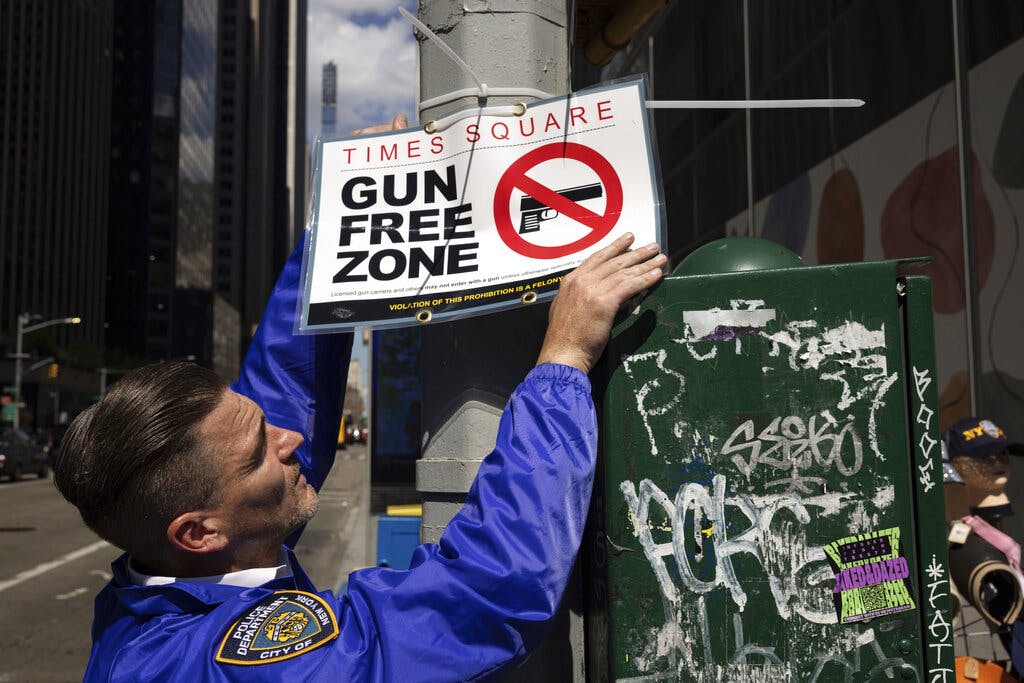Federal Judge Blocks Part of New York’s New Gun Law
‘If they don’t want the Supreme Court to take on the case or overturn them, they have to get rid of the most odious sections of the law,’ a gun rights advocate tells the Sun.

A federal judge has partially vindicated gun rights advocates fighting New York’s restrictive gun control policies by suspending portions of a new law as unconstitutional.
The judge ruled that provisions of the Concealed Carry Improvement Act, passed by Albany lawmakers in an emergency session in July, are to be temporarily suspended until a hearing on October 20.
The group that brought the case, the Gun Owners of America, said the decision represents a win for New Yorkers, and encouraged them to “exercise their rights and to defend themselves and the ones they love.”
“We are grateful to Judge Suddaby for his quick action to restore the right of the people to keep and bear arms,” the president of the Gun Owners of America, Erich Pratt, said in a statement.
The New York attorney general, Letitia James, said that her office would appeal the decision and that she would “continue to defend our responsible gun laws and fight for the safety of everyday New Yorkers.”
“While the decision preserves portions of the law, we believe the entire law must be preserved as enacted,” she said. “I will not back down from the fight to protect New Yorkers from repeated and baseless attacks on our state’s gun safety measures.”
The act was passed in response to a June Supreme Court ruling that upheld New Yorkers’ Second Amendment rights by striking down the state’s strict handgun licensing policies as a violation of the constitutional right to keep and bear arms.
The judge, Glen Suddaby of the Northern District of New York blocked the enforcement of “sensitive place” restrictions that outlaw carrying guns on some private and public property.
The “sensitive locations” portion of the law forbids firearms in a range of public places such as mass transit, libraries, bars, schools, and specific neighborhoods at New York City.
Among these “gun-free zones” created under the law is an expanded Times Square district in Midtown Manhattan stretching between Ninth and Sixth avenues and West 53rd and West 40th streets.
Under the ruling Thursday, the restrictions on concealed carry will stand in government buildings, schools, polling places, “public assemblies,” and places of worship, which Judge Suddaby deemed to have significant historical precedent.
Judge Suddaby was less sympathetic to New York’s restrictions placed on carrying guns on public transportation and in bars, entertainment venues, Times Square, and what he refers to as “all other ‘Sensitive Locations.’”
Judge Suddaby also struck down requirements that gun permit applicants disclose their social media accounts to the licensing officer. This requirement had raised First Amendment and privacy concerns among gun rights advocates.
The decision comes roughly a month after Judge Suddaby called swaths of the law “unconstitutional” while denying a request to prevent the law from going into effect on September 1.
While the current suspension of the law is only temporary and will not go into effect for three days, to allow time for an appeal, many Second Amendment advocates see these provisions as destined to be struck down.
A Republican state assemblyman from Jamestown, New York, Andy Goodell, tells the Sun that these provisions are low-hanging fruit for litigious gun rights advocates, and it’s only a matter of time before they are overturned.
“There’s no doubt in my mind that much of the legislation is unconstitutional — not all but much,” he said.
He says that the restrictions on where a gun owner can carry weapons are overbroad, and certain requirements, such as those that require an applicant to be of “good moral character,” are too vague as outlined in the legislation.
The new law requires concealed carry permit applicants to list their social media accounts from the last three years, disclose the names of those they live with, provide at least four character references, and complete a 16-hour class.
It also prevents people from carrying firearms on most private property unless specifically allowed to by the property owner.
The lawsuit in federal court at Syracuse is one of three lawsuits filed against the law in recent months in Manhattan, Buffalo, and Albany.
In the opinion of a plaintiff and attorney in the case at Manhattan, Jonathan Corbett, other licensing requirements in the law are also unconstitutional.
“The training requirement in my estimate comes out to about 40 hours and well over $1,000,” he tells the Sun. “My focus right now is on those requirements for social media, references, and training.”
He identified the social media requirements and sensitive places restrictions as the most vulnerable sections of the law, which he suspects will be struck down by the courts.
“If they don’t want the Supreme Court to take on the case or overturn them they have to get rid of the most odious sections of the law,” he said.
The New York governor’s office did not immediately respond to a request for comment.

